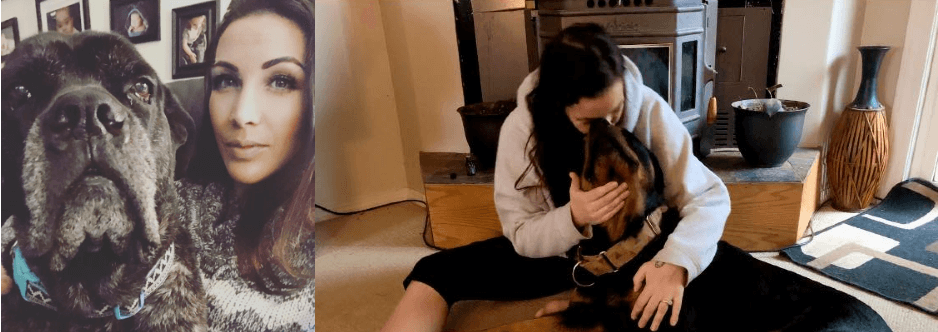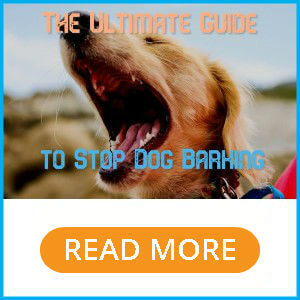
Having a dog that barks or growls excessively can be an extremely frustrating situation for pet parents, and figuring out why it’s happening and how to solve it can be a major challenge. But before you give up all hope, take some time to explore this handy guide which will provide lots of useful information and tips and tricks for you to employ so that you can both enjoy some peace and quiet and strengthen your bond.
Find What You’re Looking For:
Why Is My Dog Barking or Growling?
Before you can tackle the issue and figure out effective ways to help stop your dog from barking or growling excessively, it’s important to understand exactly why he’s barking or growling in the first place. And frankly, there are a host of reasons to consider. Some of these reasons are acceptable (and understandable), but there are also some that are unnecessary and need to be curbed.
- Boredom: When dogs are left alone for extended periods of time they may become bored and express their frustration by barking.
- Loneliness/Separation Anxiety: Similar to above, and especially with dogs who are particularly attached to the owners, being without their family can make them extremely unhappy and upset, which may lead to a doggy tantrum — resulting in excessive barking.
- Protectiveness: If your dog feels like he’s in a situation where he needs to protect you, he will probably growl or bark to “warn” you and show that he’s willing to protect you from a situation he deems to be a threatening one.
- Fear: Being placed into a place or situation that scares your dog could certainly be a reason she’s barking or growling. Just like humans yell out if they’re fearful, dogs use barking or growling as a way to express fear.
- Excitement: On the opposite side of the spectrum, if a dog is excited it may bark out to express it — like seeing a familiar face again or even meeting new people or other dogs.
- Out of Need: There’s a good possibility that when your dog needs something (like food, a toy, or to go outside to use the potty) she will bark to let you know.
- To Alert You: Anyone with Amazon Prime probably understands this one — most dogs are inclined to let you know if a delivery guy is arriving or if there’s someone at the door.
- Unfamiliarity: If your dog is placed in a place or around people they don’t know, they may feel uneasy and will growl or bark as a way of vocalizing him being weary of the situation.
By identifying the reason why your dog is barking or growling you’ll be better prepared to address it and find the method that will work best.

My Dog Won’t Stop Barking. Now What?
Before we dive into the various methods you can use to discourage your dog from excessive barking or growling, it’s important to note that the use of any painful or cruel methods of training is absolutely unacceptable and not the route you should take, as positive training methods and reinforcement is always the approach you should use. If you have an urgent situation and your dog isn’t responding to any of your approaches, we suggest contacting professional trainers or your vet to find out the best way to handle it.
We will list several ways to help make sure your dog’s barking or growling isn’t excessive, but contacting a trainer to help is certainly a valuable resource since they have the knowledge and experience on how to correct behaviors in a safe and respectful way.
Don’t Bark With Them
Your first instinct when your dog is barking excessively may be to yell at him in hopes that it will get him to stop. However, this is exactly what you don’t want to do, because your dog is going to think you’re “barking” along with him.
Rather than joining in with the cacophony, your best bet is to use a steady and firm voice with a word of your choosing to signal to your dog that her behavior is not appreciated. Using a word like “quiet” in a calm but firm voice, then rewarding her when she stops barking will make her learn that by listening to your command she’ll be rewarded.
Keep Your Dog Mentally Stimulated
If boredom is the culprit behind your dog’s excessive barking, it would behoove you to keep him busy. A dog that is mentally stimulated is a happier one, and more importantly, one less likely to act out. There are a bunch of training games that are not only fun, but would be beneficial to extending his training and the bond that you’re building together.
This is also a great opportunity to show your dog that positive reinforcement is a beneficial reward. Make sure to have plenty of positive stimuli (whether it be treats or toys) on hand so that when your dog achieves that behavior you want they’ll know it!
Consistency Is Key
Making sure that you keep things consistent is extremely important when it comes to training your dog to not bark or growl excessively. If you’re not the only one who’s going to be helping train her, it’s imperative that everyone’s on the same page. Whether it’s a family member or a dog walker or trainer, ensure that everyone is aware of the issue and knows what the plan of action is in terms of stopping it and positively reinforcing good behavior.
Define and Remove the Reinforcement
One of the main issues with dogs that bark or growl excessively is that it’s a self rewarding behavior: the more they do it, the better it feels. Sometimes it’s a bit of an adrenaline rush for them, so they naturally don’t want to stop.That’s why it’s so important to identify the reason why they’re barking or growling and control the scenario.
Is it a toy that they’re seeking? Make sure that you don’t reward them with it until the barking ceases. Same goes with dogs that are food-motivated. Your dog must understand that they control the consequence, which is why timing is essential here. By letting your dog know that their silence and patient waiting will be rewarded, they’ll realize the reward is worth the wait.
Ignore It
This may seem impossible, especially since excessive barking can be annoying, but ignoring the behavior is one method that will actually teach him to stop. By not giving him any attention he’s going to realize that his barking is pointless — he’s not going to be “rewarded” for it. While the barking is occurring, don’t engage with your dog at all. Don’t speak to him, touch him, or even look at him. And when he does stop, make sure that you reward him with treats or praise so he associates being quiet with something positive.
Keep a Controlled Environment
If there are certain things that trigger your dog, try to remove them from the situation. Does your dog bark excessively when they’re left outside alone? Make sure they’re only outside when supervised. If your dog is in a situation where someone walking by is causing her to bark or growl, take them to another room so that he can’t see the person in question. If you take away certain triggers that you know will set your dog off, it’s best to remove them from the situation or at least curb their exposure to it.
Give Your Dog a Safe Space
Providing your dog with a place that is her own and one that she identifies with feeling safe and comfortable is something that can help when it comes to excessive barking. This can be particularly helpful for dogs that suffer with separation anxiety or who are sensitive to certain things (like seeing the mailman or passing neighbors).
Pick a place in your house that you can set up a crate or bed for your dog. If you have the room for it, it would be great if it were away from the front door or windows. You can invest in comfy mats for the crate or even crate covers so that your dog feels protected. Choose a word that your dog will associate with this “quiet zone” and use it when and if she starts barking — asking her firmly to go to her “crate” or “bed” will allow her to go to a space that’s safe and free of stimuli.
Why Is My Dog Barking at Nothing?
The simple answer is: he’s not. Dogs have an absolutely incredible sense of smell and hearing, so oftentimes they can detect things that we can’t. At times it may seem like there isn’t something happening that warrants barking, but if they hear or smell things they deem a danger or worthy of communicating, they will. Be understanding of this and attempt to refocus their attention when this happens.
How Do I Stop a Barking Puppy?
If you welcome a dog into your family when they’re a puppy you have the opportunity to make sure they understand what you do and do not want from an early age. Your puppy may think because they’re coming from a pack of siblings that excessive barking is a great way to express himself and have his voice heard, but you shouldn’t allow this behavior to continue once they transition into a new environment and family.
Establishing boundaries and creating a routine (especially when it comes to excessive barking) is essential here, so make sure that you adjust according to your puppy’s behavior. For instance, if she’s barking more than usual during potty training, maybe use a bell by the door for her to signal she wants to go out.
Do Dog Barking Collars Work?
If you’re dealing with a dog that barks excessively and no amount of training seems to work, you may think of considering dog barking collars.There are many types of dog collars to stop excessive or unwanted barking and none of them tackle the root cause of stress that’s triggering your dog to bark. We strongly disagree with shock collars or any collars that can cause your dog unnecessary pain, injury, or discomfort. If you are going to use a collar, ensure that you are using one that is humane and that you operate it responsibly. Please read more about collars here: https://www.humanesociety.org/resources/dog-collars
But do they work? Yes, in most cases they do. There are cautions for dog owners to be aware of though, like how some collars will activate on the sound of any bark – this could result in the collar going off any time a dog barks nearby. It’s also important to note that there are a variety of dog barking collars available and you should pick the right one based on your dog.
Essentially how dog barking collars work is that they sense vibrations from your dog’s vocal cords and in return provides a stimulus that’s often unfavorable as a consequence. Some collars send a static shock, but there are also some available that spray citronella liquid (which is unpleasant to dogs). There’s also ultrasonic ones that send very high-pitched and unpleasant sounds when triggered to deter nuisance barking.
Will Dog Whistles Stop My Dog From Barking?
Like the ultrasonic dog barking collar mentioned above, dog whistles are another alternative to achieving the goal of stopping your dog from barking excessively. When your dog starts to bark excessively simply use the dog whistle which will omit a high-pitched and unpleasant sound and distract your dog from the stimulus. When your dog settles and the barking ceases, make sure to reward her with a treat so she knows she’ll be rewarded once the bad behavior ends.
Will Muzzles Stop My Dog From Barking?
Similar to dog owners who use muzzles in fear of dogs biting others, a muzzle can also be utilized to prevent excessive barking. However, muzzles are typically meant to be used only for short periods of time, and won’t completely solve the problem. If you’re in a situation where you need a “quick fix” then using a muzzle will help, but it’s not a long term solution and it should never be used unsupervised. Instead you should focus on getting to the root of the problem and working to train your dog to stop barking.
How Do I Stop My Dog From Growling at Strangers?
Even though it can be frustrating that your dog growls at unfamiliar people (whether it’s on a walk or even when you welcome guests into your home), it’s their attempt to communicate with you. It may be because they’re scared, uncomfortable, in pain, and territorial, among other reasons. Although you may want to scold them for growling, you need to identify the underlying issue and address that first and foremost. Do your best to eliminate certain triggers or put him in stressful situations. Warn others that there is an issue and try to introduce them in a calm and collected way so as not to heighten your dog’s anxiety.
Why Do Dogs Bark?
Dogs who bark excessively can cause high levels of frustration for their owners, but even though it seems like a lost cause and nothing can help, there are ways to modify this behavior and give owners hope. There are several reasons why dogs bark; some are acceptable, and some are not. The most common types of barking include boredom barking for self-amusement; alert barking to let you know something has been seen or heard that is out of the ordinary; attention seeking barking; frustration barking when a dog is confused, frustrated, or stressed out; and defensive barking to make something scary go away.
More About Dog Barking With Niki Perry (CPDT-KA, KPACTP, CEMT)
Look at the Whole Picture
Although on the surface excessive barking can be terribly frustrating and stressful to deal with, it is sometimes a symptom of a deeper issue such as boredom, stress, or even fear. In many cases if you work on healing the root cause, the symptom will likely go away on its own. On the other hand, if you simply focus on stopping the barking, the root could just surface in another way which may be worse than the initial problem. Treat the root cause not just the surface symptom.
Define the Cause and Train an Alternative
Often barking is just simple communication: “I need to pee.” “There is someone at the door!” “I want to come in.” Give your dog a voice, in a sense that if they have something to tell you, listen to them and then determine whether that particular barking was an appropriate form of communication. If their response to that circumstance is not how you would like them to react then choose a very specific alternative behavior to teach them. If your dog barks to tell you that he needs to go out and potty and you would prefer a less noisy form of communication, you could teach them to ring a bell instead. Reinforcement is the key to learning, so simply interrupting an undesirable behavior isn’t enough information for your dog. Instead, you could interrupt and cue another reinforceable behavior or teach a new behavior that is incompatible with the existing problem behavior.
Define and Remove the Reinforcement
What makes working though excessive barking so difficult, especially with dogs who bark for attention, is that it is a self-rewarding behavior. The more the dog does it, the stronger the behavior becomes, and it feels good to them as well. Considering this, I rarely recommend waiting for the behavior to stop on its own; instead I recommend removing whatever resource the dog is attempting to gain such as a toy, attention, getting out of the kennel, dinner served, and so on, and then only present it again once the barking has ceased. The dog must understand that they control the consequence. So, your timing has to be precise in order to tell the dog that their silent and patient waiting is what causes their toy, food, or whatever to appear.
Keep a Controlled Environment
Anytime you are working through a training program, the key to your success will be your ability to control your environment to keep the undesirable behavior from being triggered and inadvertently reinforced. For example, a dog that barks in the backyard when left unattended needs to be kept inside unless someone is able to be outside with her. If you have a dog that barks at every person or dog that walks past the window, keep the blinds drawn unless you are there to handle the situation or have a scheduled training session.
A Final Note
If you feel that your dog is barking out of fear, please seek the help of a skilled and certified professional dog trainer in your area. Fear can quickly turn into serious aggression if not dealt with appropriately by a trained professional who understands the science of behavior modification. There are many sites available to dog owners who need to find trained professional animal trainers and canine behavior consultants.
Visit the Certification Council for Professional Dog Trainers to find a qualified dog trainer near you.
There are many causes of excessive barking but it is not a lost cause without hope for improvement. Just remember to remove the reinforcement for inappropriate barking and reward, reward, reward any desired responses you are seeking. If you set your dog up for success, you will see it happen.
by Niki Perry, CPDT-KA, KPACTP, CEMT, Release the Hounds Board Member
Have any specific problems with your dog’s barking?
Let us know on Facebook!






